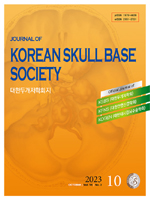Background: To evaluate surgical outcomes of petroclival meningiomas based on tumor types and approaches, including the endoscopic transorbital approach (eTOA).
Materials and Methods: This retrospective study reviewed 47 patients who underwent surgery for petroclival meningioma in Asan Medical Center from March 2021 to December 2022. Tumor types were classified into cavernous, upper clival, petrous apex, and tentorial. Surgical approaches included anterior petrosal, combined petrosal, retrosigmoid, and eTOA. Outcomes were analyzed based on tumor size, extent of resection, and cranial nerve preservation.
Results: Patients’ median follow-up was 13.6 months. The mean tumor size was 3.2 cm. WHO grade 1 meningioma was found in 37 patients, and grade 2 in 10. Preoperative symptoms included facial pain (46.8%), headache (19.1%), and hearing loss (19.1%). The most common surgical approach was anterior petrosal approach (63.8%). Gross total resection (GTR) was achieved more frequently in smaller tumors (mean size 3.1 cm, P = 0.038) and those with high T2 weighted-image signal intensity (P = 0.013). Postoperative complications included abducens nerve palsy in 11 patients (23%), followed by oculomotor and trochlear nerve palsies in 6 patients (13%). Surgery-related complications also included cerebrospinal fluid leakage in 4 patients (9%) and temporal lobe injury in 5 patients (11%).
Conclusions: Surgical outcomes of petroclival meningiomas are influenced by tumor type and approach. GTR is associated with smaller tumor size and specific imaging characteristics. Comprehensive anatomical knowledge and multidisciplinary collaboration are essential for optimizing surgical outcomes and minimizing morbidity.



